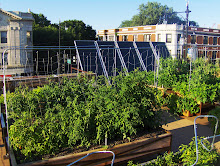This last Friday and Saturday we hosted more volunteer workdays and got A LOT of work done. It all started with two piles of compost, a stack of cedar boards and some pre-fab metal brackets. Then we added the help of over 20 volunteers and bam! we have raised beds at ground level now!


To build the beds we first took a large amount of the soil that was in the existing brick planter beds that are built against the restaurant and moved it to the new raised beds by the alley way. This soil had a very high clay content and will act as a natural barrier between the roots and the city dirt beneath the clay. When you are growing in the city it is really important to pay attention to what the land was used to prior to you being there. If there is any chance that the soil could have heavy metals in it, you should get it tested and find out for sure. You don't want to be ingesting those metals through your hard earned produce. Most universities can test your soil, but doing a simple search for soil testing in your state will help you find out more. There is usually a minimal fee for this service, usually less than $30, and it is well worth it. Make sure to test for all heavy metals and chemicals, none of which you want reaching your plate.


We put down clay to help protect our plants and then topped the 6 inches of clay with a good 12 inches of compost. Our compost came from Growing Power in Milwaukee, they delivered the two steaming piles on Wednesday, 15 cubic yards of healthy live compost. Their compost seems to contain a lot of mulch, which will hopefully allow for a lot of aeration. Most times you will want to mix your compost with vermiculite or coir (coconut fibers) to make it lighter and more airy for the roots to push through. A lot of times people use peat moss to lighten their compost, but peat moss is "mined" from wetlands and bogs, and cannot grow as fast as we are taking it. Not the most sustainable option. Coir is a by-product of coconut farming and works just as well for aerating your compost.
On Saturday our volunteers help assemble the cedar planks and brackets, and then we filled the beds with compost. The brackets were bought from Gardener's Supply Catalog, and I would highly recommend these as a very easy solution to building raised beds and having them look professional. The cedar was purchased from Menard's and delivered in pre-cut lengths. Although we did have to trim some of the boards to fit in the spaces, Michael worked super hard to get everything the perfect size for our space! The past few days it has rained all over the four raised beds and it is helping to settle the soil, they look great!

We will be using the raised beds near the alley to grow the three sisters: corn, beans and squash. The corn will mostly be ornamental, but we plan on using it when we can. We'll be growing Two-Inch Strawberry Popcorn, which is small and pink and super cute. Hopefully we can pop this into a great garnish for a dish in the restaurant. Also, we will grow amaranth and quinoa, both of which get really tall and will provide a great barrier to the alleyway.
There are some concerns about the effect of the street being so close to the beds, giving us exhaust and brake pad kickoff to deal with. This is definitely a concern for us, given that we want all of what we produce to be edible and healthy. We have decided to put up bamboo fencing to block the street from our beloved produce, hopefully reducing the off-gas of the vehicles that reaches the plants. We will monitor this as we go along, continuing to add to the ongoing experiment of an urban farm.
The raised beds that are near the building will be used for edible flowers, herbs, sunflowers and currant bushes. This will allow for the chefs and bartenders to have easy access to the garnishes and herbs they use most frequently for drinks and dishes.
All in all the raised beds were a lot of work, but worth what we will gain from them in both beauty and bounty. Thank you to all our really hard working volunteers!!!







Hi. Glad to hear you're using our raised bed corners. I love them too because I'm not an ace with the tools. Plants, yes; tools, no! The corners make it pretty much foolproof. Your project sounds amazing. I look forward to hearing how it goes. -David Grist, Gardener's Supply
ReplyDeletetwo inch strawberry popcorn! love it!
ReplyDeletequinoa sounds interesting too . . . where did you find the seeds? could i plant my quinoa that i purchased out of the bulk bin? do you know how to best harvest the quinoa? i know its a seed, and not a grain . . .